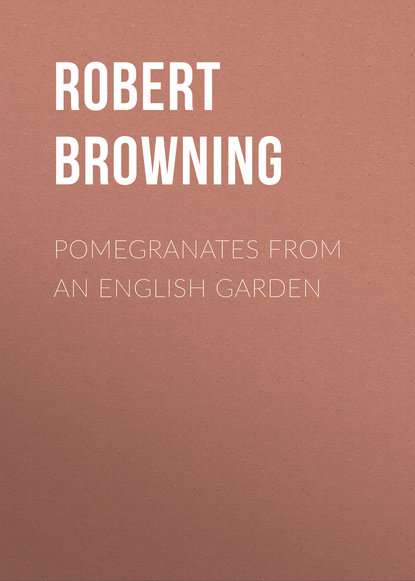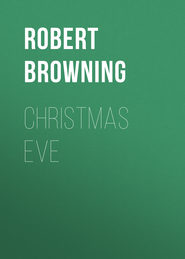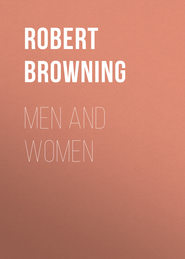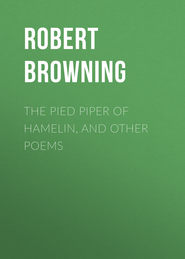По всем вопросам обращайтесь на: info@litportal.ru
(©) 2003-2024.
✖
Pomegranates from an English Garden
Настройки чтения
Размер шрифта
Высота строк
Поля
Oh, love of those first Christian days!
– Fanned so soon into a blaze,
From the spark preserved by the trampled sect,
That the antique sovereign Intellect
Which then sat ruling in the world,
Like a change in dreams, was hurled
From the throne he reigned upon:
You looked up and he was gone.
The remainder of the stanza is taken up with a most eloquent, but somewhat difficult passage, illustrating the triumph of the new Love over the old Culture. In the following stanza he makes up his mind that he “will feast his love, then depart elsewhere, that his intellect may find its share”; so the next transition, by the same mode of rapture, is to a German University. What he sees there provokes again his latent humour: —
XIV
Alone! I am left alone once more —
(Save for the garment’s extreme fold
Abandoned still to bless my hold)
Alone, beside the entrance-door
Of a sort of temple, – perhaps a college,
– Like nothing I ever saw before
At home in England, to my knowledge.
The tall old quaint irregular town!
It may be … though which, I can’t affirm … any
Of the famous middle-age towns of Germany;
And this flight of stairs where I sit down,
Is it Halle, Weimar, Cassel, Frankfort,
Or Göttingen, I have to thank for ’t?
It may be Göttingen, – most likely.
Through the open door I catch obliquely
Glimpses of a lecture-hall;
And not a bad assembly neither,
Ranged decent and symmetrical
On benches, waiting what’s to see there;
Which, holding still by the vesture’s hem,
I also resolve to see with them,
Cautious this time how I suffer to slip
The chance of joining in fellowship
With any that call themselves his friends;
As these folks do, I have a notion.
But hist – a buzzing and emotion!
All settle themselves, the while ascends
By the creaking rail to the lecture-desk,
Step by step, deliberate
Because of his cranium’s over-freight,
Three parts sublime to one grotesque,
If I have proved an accurate guesser,
The hawk-nosed, high-cheek-boned Professor.
I felt at once as if there ran
A shoot of love from my heart to the man —
That sallow virgin-minded studious
Martyr to mild enthusiasm,
As he uttered a kind of cough-preludious
That woke my sympathetic spasm,
(Beside some spitting that made me sorry)
And stood, surveying his auditory
With a wan pure look, well nigh celestial, —
Those blue eyes had survived so much!
While, under the foot they could not smutch,
Lay all the fleshly and the bestial.
Over he bowed, and arranged his notes,
Till the auditory’s clearing of throats
Was done with, died into a silence;
And, when each glance was upward sent,
Each bearded mouth composed intent,
And a pin might be heard drop half a mile hence
He pushed back higher his spectacles,
Let the eyes stream out like lamps from cells,
And giving his head of hair – a hake
Of undressed tow, for colour and quantity —
One rapid and impatient shake,
(As our own young England adjusts a jaunty tie
When about to impart, on mature digestion,
Some thrilling view of the surplice-question)
– The Professor’s grave voice, sweet though hoarse,
Broke into his Christmas-Eve discourse.
The stanza which follows gives an account of the discourse, which is a learned discussion of “this Myth of Christ,” “which, when reason had strained and abated it of foreign matter, left, for residuum, a man! – a right true man,” but nothing more. He has no difficulty in determining his duty here (“this time He would not bid me enter.”) The religious atmosphere in which Papist and Dissenter live may be far from pure, in the one case for one reason, and in the other for the opposite; but either of the two is immeasurably better than the vacuum left when the Critic has done his work of destruction. Then follows a long argument to show the unreasonableness of denying the divinity of Christ, only a part of which can be given here.
XVI
* * * * *
This time he would not bid me enter
The exhausted air-bell of the Critic.
Truth’s atmosphere may grow mephitic
When Papist struggles with Dissenter,
Impregnating its pristine clarity,
– One, by his daily fare’s vulgarity,
Its gust of broken meat and garlic;
– One, by his soul’s too-much presuming
To turn the frankincense’s fuming
And vapours of the candle starlike
Into the cloud her wings she buoys on.
Each, that thus sets the pure air seething,
May poison it for healthy breathing —
But the Critic leaves no air to poison;
Pumps out with ruthless ingenuity
Atom by atom, and leaves you – vacuity.
Thus much of Christ, does he reject?
And what retain? His intellect?
What is it I must reverence duly?
– Fanned so soon into a blaze,
From the spark preserved by the trampled sect,
That the antique sovereign Intellect
Which then sat ruling in the world,
Like a change in dreams, was hurled
From the throne he reigned upon:
You looked up and he was gone.
The remainder of the stanza is taken up with a most eloquent, but somewhat difficult passage, illustrating the triumph of the new Love over the old Culture. In the following stanza he makes up his mind that he “will feast his love, then depart elsewhere, that his intellect may find its share”; so the next transition, by the same mode of rapture, is to a German University. What he sees there provokes again his latent humour: —
XIV
Alone! I am left alone once more —
(Save for the garment’s extreme fold
Abandoned still to bless my hold)
Alone, beside the entrance-door
Of a sort of temple, – perhaps a college,
– Like nothing I ever saw before
At home in England, to my knowledge.
The tall old quaint irregular town!
It may be … though which, I can’t affirm … any
Of the famous middle-age towns of Germany;
And this flight of stairs where I sit down,
Is it Halle, Weimar, Cassel, Frankfort,
Or Göttingen, I have to thank for ’t?
It may be Göttingen, – most likely.
Through the open door I catch obliquely
Glimpses of a lecture-hall;
And not a bad assembly neither,
Ranged decent and symmetrical
On benches, waiting what’s to see there;
Which, holding still by the vesture’s hem,
I also resolve to see with them,
Cautious this time how I suffer to slip
The chance of joining in fellowship
With any that call themselves his friends;
As these folks do, I have a notion.
But hist – a buzzing and emotion!
All settle themselves, the while ascends
By the creaking rail to the lecture-desk,
Step by step, deliberate
Because of his cranium’s over-freight,
Three parts sublime to one grotesque,
If I have proved an accurate guesser,
The hawk-nosed, high-cheek-boned Professor.
I felt at once as if there ran
A shoot of love from my heart to the man —
That sallow virgin-minded studious
Martyr to mild enthusiasm,
As he uttered a kind of cough-preludious
That woke my sympathetic spasm,
(Beside some spitting that made me sorry)
And stood, surveying his auditory
With a wan pure look, well nigh celestial, —
Those blue eyes had survived so much!
While, under the foot they could not smutch,
Lay all the fleshly and the bestial.
Over he bowed, and arranged his notes,
Till the auditory’s clearing of throats
Was done with, died into a silence;
And, when each glance was upward sent,
Each bearded mouth composed intent,
And a pin might be heard drop half a mile hence
He pushed back higher his spectacles,
Let the eyes stream out like lamps from cells,
And giving his head of hair – a hake
Of undressed tow, for colour and quantity —
One rapid and impatient shake,
(As our own young England adjusts a jaunty tie
When about to impart, on mature digestion,
Some thrilling view of the surplice-question)
– The Professor’s grave voice, sweet though hoarse,
Broke into his Christmas-Eve discourse.
The stanza which follows gives an account of the discourse, which is a learned discussion of “this Myth of Christ,” “which, when reason had strained and abated it of foreign matter, left, for residuum, a man! – a right true man,” but nothing more. He has no difficulty in determining his duty here (“this time He would not bid me enter.”) The religious atmosphere in which Papist and Dissenter live may be far from pure, in the one case for one reason, and in the other for the opposite; but either of the two is immeasurably better than the vacuum left when the Critic has done his work of destruction. Then follows a long argument to show the unreasonableness of denying the divinity of Christ, only a part of which can be given here.
XVI
* * * * *
This time he would not bid me enter
The exhausted air-bell of the Critic.
Truth’s atmosphere may grow mephitic
When Papist struggles with Dissenter,
Impregnating its pristine clarity,
– One, by his daily fare’s vulgarity,
Its gust of broken meat and garlic;
– One, by his soul’s too-much presuming
To turn the frankincense’s fuming
And vapours of the candle starlike
Into the cloud her wings she buoys on.
Each, that thus sets the pure air seething,
May poison it for healthy breathing —
But the Critic leaves no air to poison;
Pumps out with ruthless ingenuity
Atom by atom, and leaves you – vacuity.
Thus much of Christ, does he reject?
And what retain? His intellect?
What is it I must reverence duly?








